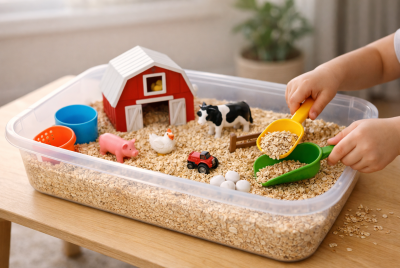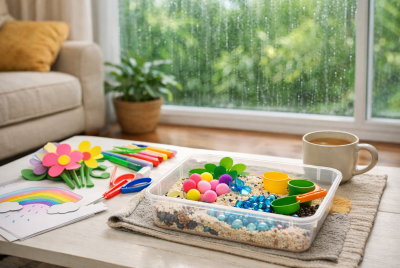Parenting Trap: Recognizing, Avoiding, and Overcoming Common Pitfalls
We may earn a commission for purchases made using our links. Please see our disclosure to learn more.
Being a parent is one of the most fulfilling experiences in life, but let’s face it, there are a lot of unforeseen difficulties that might arise. No matter their level of experience, all parents have times when they feel trapped in a vicious cycle of annoyance, guilt, or fatigue. These incidents frequently result from what are referred to as “parenting trap,” which are behavioral patterns that initially appear beneficial but ultimately make life more difficult.
You’re not alone if you’ve ever been overwhelmed by social expectations, continually comparing your parenting style to others, or second-guessing your choices. The good news? You may avoid these pitfalls and discover a more balanced, healthful parenting style once you are aware of them.
What Is a Parenting Trap?
A parenting trap is similar to a cunning small hole in the road that you don’t notice until you’re in it. It’s a behavior, attitude, or response that adds unnecessary stress to parenting. The problematic thing is that most of these traps initially appear harmless. They frequently originate from a sense of love, protection, or even a desire to provide your child the greatest life possible.
The problem is that some of these behaviors can make children more reliant, nervous, or even unwilling to follow instructions. Consider it akin to attempting to assist a butterfly in emerging from its cocoon. The butterfly never gains the strength to fly if it doesn’t struggle on its own, despite its apparent kindness.
The “Perfect Parent” Trap
Have you ever encountered parents who appear to have it all together while scrolling through social media? Color-coded schedules, homemade lunches shaped like cartoon characters, and children who mysteriously never act out in public? “Why can’t I be more like that?” is a common thought.
In actuality, there is no such thing as flawless parenting. Every “perfect” photo hides a breakdown, a disorganized kitchen, or a sleepless night. Pursuing this unattainable ideal simply causes anxiety and self-doubt. Your child wants your love and attention, not a faultless performance, so instead of aiming for perfection, concentrate on being present.

The Overprotection Trap
No parent enjoys seeing their child struggle. It’s natural to want to step in and shield them from disappointment, failure, or even minor discomfort. But overprotecting them is like holding onto a bike while they’re trying to learn to ride—it keeps them from figuring things out on their own.
Kids need to experience failure and frustration to build resilience. If they never fall, they won’t learn how to get back up. Life will throw challenges their way, and your job isn’t to remove every obstacle—it’s to teach them how to face them with confidence.
The Comparison Trap
It’s hard not to compare, isn’t it? Maybe your neighbor’s kid started reading at three, and yours is still struggling with ABCs at five. Maybe your friend’s child eats vegetables without a fuss, while yours would rather go on a hunger strike.
Comparison, though, is one of the quickest ways to feel like you’re failing as a parent. Each child is different, with their own talents and schedule. Instead of looking sideways at what other kids are doing, celebrate the little victories your child is making. Growth is not a race—it’s a journey.
The “Because I Said So” Trap
Every parent has used this phrase at some point, usually in a moment of exhaustion. While it’s tempting to shut down endless “why” questions with a firm response, kids crave understanding. When they know why a rule exists, they’re more likely to respect it rather than just follow it out of fear.
Instead of issuing commands, try explaining the reason behind them. “We hold hands in the parking lot because cars might not see you” makes a bigger impact than just saying, “Do it because I said so.” A little explanation can turn resistance into cooperation.
The “Always Say Yes” Trap
Saying no is hard, especially when those puppy-dog eyes are staring up at you. It’s easier to give in to the extra piece of candy, the late bedtime, or the expensive toy just to avoid a meltdown. But too many yeses can turn into a bigger problem—kids who expect instant gratification and struggle with boundaries.
Children actually feel safer when there are clear limits. It teaches them patience and self-control, two skills they’ll need for the rest of their lives. Saying no doesn’t make you mean—it makes you a responsible parent.
The Guilt Trap
Parental guilt is real, and it sneaks up on you in the smallest moments. Maybe you worked late and missed bedtime. Maybe you lost your patience and snapped. Maybe you feel bad because you can’t afford the latest gadget their friends have.
Guilt can be paralyzing, but here’s the thing—your child doesn’t need a perfect parent. They need a present one. Instead of dwelling on what you didn’t do, focus on what you can do. A heartfelt hug, an apology, or simply sitting down to listen goes a long way.
The “Pleasing Others” Trap
It’s easy to feel pressure from family, friends, or society about how to raise your child. Maybe your parents expect you to discipline the same way they did, or your neighbor constantly brags about their parenting techniques.
But parenting isn’t a performance for an audience. What works for others may not work for you. Trust your instincts and focus on what’s best for your child, not what looks good to others.
The “I’ll Do It Myself” Trap
Sometimes it’s just faster and easier to do things for your child rather than wait for them to struggle through it. Tying their shoes, cleaning up their mess, or fixing their school project can feel like saving time, but in reality, it takes away valuable learning opportunities.
Kids gain confidence by doing things on their own, even if it takes longer. The next time you’re tempted to step in, take a deep breath and let them try. They’ll surprise you with what they can handle.
The Over-Scheduling Trap
Between school, sports, tutoring, and playdates, kids today have schedules that rival most adults. While activities are great, overscheduling leaves little room for rest, creativity, and just being a kid.
Boredom isn’t the enemy—it’s actually when creativity flourishes. Sometimes the best thing you can do is leave empty space in their day and let them figure out how to fill it.
The “Ignoring Self-Care” Trap
It’s easy to put yourself last when you’re a parent. There’s always something that needs to be done—laundry, homework help, meal prep. But running on empty helps no one.
Taking care of oneself is not selfish; rather, it is essential. A well-rested, happy parent is far more effective than a burnt-out, exhausted one. Even if it’s just five minutes of quiet time with a cup of tea, take it. You deserve it.

Recommended Parenting Products
Navigating the world of parenting can be overwhelming, but having the right tools can make a significant difference. Here are some highly recommended products that can help streamline your parenting journey:
1. Doona Car Seat & Stroller Travel System
Transitioning between car seat and stroller has never been easier. The Doona Car Seat & Stroller Combo allows you to move your baby from the car to the stroller in seconds, making outings more convenient. Its innovative design has garnered positive feedback from parents for its practicality.
2. Graco 4Ever DLX 4-in-1 Car Seat
Safety and longevity are key when it comes to car seats. The Graco 4Ever DLX 4-in-1 Car Seat adapts as your child grows, serving as an infant seat, convertible seat, and booster. Parents appreciate its durability and ease of installation.
Keeping your baby close while having your hands free is a game-changer. The Beco Gemini Baby Carrier offers comfort for both parent and child, with adjustable straps and multiple carrying positions. It’s a favorite among parents for its ergonomic design.
Use the Yoto Player to promote entertainment without a screen. This audio device plays stories, music, and educational content, fostering imagination and learning in children. Parents have noted its user-friendly interface and diverse content library.
5. Dr. Brown’s Formula Mixing Pitcher
Preparing bottles in advance can save time during those hectic moments. Dr. Brown’s Formula Mixing Pitcher allows you to mix up to four bottles at once, reducing air bubbles and ensuring a smooth consistency. It’s a handy tool for formula-feeding parents.
Investing in quality products can ease the challenges of parenting, allowing you to focus more on creating cherished memories with your little ones.
The Hidden Effects of Parenting Styles on Child Development
Parenting is more than just nurturing and discipline—it shapes a child’s long-term well-being, academic performance, and mental health. Research from Washington University in St. Louis highlights how parental personality traits influence children’s success. The study found that children with extraverted parents tended to have lower academic performance, while those raised by neurotic parents exhibited higher stress levels and poorer health. This suggests that parents’ emotional states and behaviors have a lasting impact on their child’s development.
Similarly, research on parental burnout and its consequences sheds light on the dangers of striving for perfection in parenting. The pressure to meet unrealistic standards can lead to exhaustion, emotional detachment, and, in severe cases, negative interactions with children. Experts emphasize the importance of self-care and setting realistic expectations to prevent burnout and foster healthier parent-child relationships. Recognizing these hidden traps can help parents create a more balanced and nurturing environment for their children.
Conclusion: Breaking Free from Parenting Traps
Parenting is a learning process, and no one gets it right all the time. The key is recognizing when you’ve fallen into a trap and making small changes to get out. Give yourself grace, adjust as you go, and remember—your love and effort are what matter most.
FAQs About Parenting Traps
What’s the most common parenting trap?
The “perfect parent” trap. Many parents feel pressure to live up to impossible standards, which only leads to stress and frustration.
How can I break out of a parenting trap?
Start by recognizing the pattern. Once you see it, make small, conscious changes. Even small shifts can make a big difference.
Is it bad to reward my child for good behavior?
Not necessarily, but rewards shouldn’t be the main motivation. Teaching kids to find value in doing the right thing on their own is more important than external rewards.
What if I’ve already fallen into a parenting trap?
It’s never too late to change. Parenting is about learning and growing, so give yourself permission to adjust and try new approaches.
How do I balance discipline and fun?
Set clear expectations while making room for play, laughter, and connection. A mix of structure and spontaneity keeps things balanced.
Parenting isn’t about being perfect. It’s about being present, learning, and growing alongside your child. And that, more than anything, is what truly matters. ❤️




